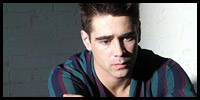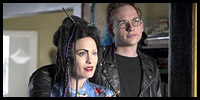
 |
|
A Home at the End of the World (2004) Cast: Colin Farrell, Dallas Roberts, Robin Wright Penn, Sissy Spacek, Erik Smith, Harris Allan, Andrew Chalmers, Ryan Donowho, Wendy Crewson, Ron Lea, Matt Frewer, Joshua Close, Asia Vieira 2004 – 95 minutes Rated: Reviewed by Dustin Putman, July 24, 2004.  Based on the novel by "The Hours" author Michael Cunningham (who also wrote the screenplay), there is a great motion picture struggling to get out of "A Home at the End of the World" that never quite reaches fruition. Individual sections and scenes are remarkable, unblinkingly truthful and emotionally accurate in their views of human nature, but the film falls victim in its attempt to cram too much information and too many random events into a 95-minute feature. As a book, the story told here probably forms a complete, layered, and enriching whole. As a cinematic drama, the same story is episodic and never fully realized. Fortunately, there is enough that is exquisitely good to make up for many of its narrative downfalls.
Based on the novel by "The Hours" author Michael Cunningham (who also wrote the screenplay), there is a great motion picture struggling to get out of "A Home at the End of the World" that never quite reaches fruition. Individual sections and scenes are remarkable, unblinkingly truthful and emotionally accurate in their views of human nature, but the film falls victim in its attempt to cram too much information and too many random events into a 95-minute feature. As a book, the story told here probably forms a complete, layered, and enriching whole. As a cinematic drama, the same story is episodic and never fully realized. Fortunately, there is enough that is exquisitely good to make up for many of its narrative downfalls.
 The plot spans three decades, documenting the crucial events in the life of Bobby Morrow (Colin Farrell), a sincere, twinkly-eyed innocent who refuses to put labels on the love relationships he forms. As a 9-year-old (Andrew Chalmers) in 1967, he witnessed the tragic death of his beloved teenage brother, Carlton (Ryan Donowho), who taught him about sex and introduced him to the "clarity" of dropping acid. As a 15-year-old (Erik Smith), Bobby befriends Jonathan Glover (Harris Allan) and his liberal mother, Alice (Sissy Spacek), who welcomes him into their home following the death of his father. Jonathan and Bobby's relationship extends past mere friendship and into sexual experimentation, but it means something a little different for both of them.
The plot spans three decades, documenting the crucial events in the life of Bobby Morrow (Colin Farrell), a sincere, twinkly-eyed innocent who refuses to put labels on the love relationships he forms. As a 9-year-old (Andrew Chalmers) in 1967, he witnessed the tragic death of his beloved teenage brother, Carlton (Ryan Donowho), who taught him about sex and introduced him to the "clarity" of dropping acid. As a 15-year-old (Erik Smith), Bobby befriends Jonathan Glover (Harris Allan) and his liberal mother, Alice (Sissy Spacek), who welcomes him into their home following the death of his father. Jonathan and Bobby's relationship extends past mere friendship and into sexual experimentation, but it means something a little different for both of them.
 Switch forward to 1982, 24-year-old Bobby steps into the "real world" for the first time and quickly reunites with the now openly gay Jonathan (Dallas Roberts), living in Greenwich Village with his platonic, older gal pal, Clare (Robin Wright Penn). Clare is drawn to Bobby's honesty and sweetness, even as she still pines for the unobtainable Jonathan, while Bobby, who is somewhere on the line of bisexuality without really caring about labels, falls in love with both of them. The three decide to start an unconventional family, complete with a newborn daughter, but it isn't long before this offbeat arrangement of various couplings starts to weigh down on their happy existence.
Switch forward to 1982, 24-year-old Bobby steps into the "real world" for the first time and quickly reunites with the now openly gay Jonathan (Dallas Roberts), living in Greenwich Village with his platonic, older gal pal, Clare (Robin Wright Penn). Clare is drawn to Bobby's honesty and sweetness, even as she still pines for the unobtainable Jonathan, while Bobby, who is somewhere on the line of bisexuality without really caring about labels, falls in love with both of them. The three decide to start an unconventional family, complete with a newborn daughter, but it isn't long before this offbeat arrangement of various couplings starts to weigh down on their happy existence.
 So much happens in "A Home at the End of the World" that the expansive premise is a near-impossible one to explain. Directed by Michael Mayer (in his debut effort), the film is made up of a long series of events rather than a clear-cut plot, a side effect of its literary source material. The opening thirty minutes, set during Bobby's formidable childhood and teenage years, are just about perfect in their conception and treatment. The friendship/sexual relationship that forms between Bobby and Jonathan is captured with such an achingly real, detailed eye that most viewers will be taken directly back to memories of their own teen experiences. Director Mayer doesn't shy away from the carnal side of their friendship, making the scenes between Bobby and Jonathan all the more fresh and natural. There are also some big laughs that come out of character actions and performances rather than through obvious jokes, the most memorable being Alice's near-giddy introduction to marijuana by her son and his friend. This particular scene, culminating in a beautifully handled three-way dance to the singing of Laura Nyro, unfolds with such a lovely, affectionate eye that you feel like embracing it and never letting go.
So much happens in "A Home at the End of the World" that the expansive premise is a near-impossible one to explain. Directed by Michael Mayer (in his debut effort), the film is made up of a long series of events rather than a clear-cut plot, a side effect of its literary source material. The opening thirty minutes, set during Bobby's formidable childhood and teenage years, are just about perfect in their conception and treatment. The friendship/sexual relationship that forms between Bobby and Jonathan is captured with such an achingly real, detailed eye that most viewers will be taken directly back to memories of their own teen experiences. Director Mayer doesn't shy away from the carnal side of their friendship, making the scenes between Bobby and Jonathan all the more fresh and natural. There are also some big laughs that come out of character actions and performances rather than through obvious jokes, the most memorable being Alice's near-giddy introduction to marijuana by her son and his friend. This particular scene, culminating in a beautifully handled three-way dance to the singing of Laura Nyro, unfolds with such a lovely, affectionate eye that you feel like embracing it and never letting go.
 Sissy Spacek (2001's "In the Bedroom") delivers a heartbreaking, funny, award-worthy turn as Alice, Jonathan's liberal, frustrated mother. This is as superlative as the acting gets in a film whose every performance elevates the scattered screenplay. A scene in which Alice's discomfort with the teen Bobby segues into mutual respect and love as she teaches him how to make a pie is marvelously resonant and lightly poignant. Spacek lights up every scene she is in, and consistently surprises; it is a miraculous performance. As the adult Bobby, Colin Farrell expands his usual heroic, masculine hero roles (2003's "The Recruit," 2003's "SWAT") with one that is gentle, kind, and admittedly a little hard to read, which turns out to be one of his charms. Farrell perfects an American accent, but where he really shines is in relaying Bobby's childlike vulnerability and sexual appeal. Newcomer Dallas Roberts is every bit Farrell's match as the adult Jonathan, a man who hides behind one-night-stands and sarcasm to relieve the pain that goes with his feelings for Bobby. Robin Wright Penn (2001's "The Pledge") rounds out the leads as the uninhibited and touching Clare, who can't help but feel like the third wheel when she stops to take a look at what Bobby and Jonathan have together.
Sissy Spacek (2001's "In the Bedroom") delivers a heartbreaking, funny, award-worthy turn as Alice, Jonathan's liberal, frustrated mother. This is as superlative as the acting gets in a film whose every performance elevates the scattered screenplay. A scene in which Alice's discomfort with the teen Bobby segues into mutual respect and love as she teaches him how to make a pie is marvelously resonant and lightly poignant. Spacek lights up every scene she is in, and consistently surprises; it is a miraculous performance. As the adult Bobby, Colin Farrell expands his usual heroic, masculine hero roles (2003's "The Recruit," 2003's "SWAT") with one that is gentle, kind, and admittedly a little hard to read, which turns out to be one of his charms. Farrell perfects an American accent, but where he really shines is in relaying Bobby's childlike vulnerability and sexual appeal. Newcomer Dallas Roberts is every bit Farrell's match as the adult Jonathan, a man who hides behind one-night-stands and sarcasm to relieve the pain that goes with his feelings for Bobby. Robin Wright Penn (2001's "The Pledge") rounds out the leads as the uninhibited and touching Clare, who can't help but feel like the third wheel when she stops to take a look at what Bobby and Jonathan have together.
 The further "A Home at the End of the World" barrels toward its conclusion, the more aimless the film gets. Even if the characters are original and sympathetic creations, the story developments are too vague and rapid to work the way they should. A cafe Bobby opens and the arrival of Clare's child are especially undernourished, playing like afterthoughts than vivid ideas. And the final scene, well-played as it is, leaves the viewer speculating as to what, exactly, was the point or goal the film was trying to make.
The further "A Home at the End of the World" barrels toward its conclusion, the more aimless the film gets. Even if the characters are original and sympathetic creations, the story developments are too vague and rapid to work the way they should. A cafe Bobby opens and the arrival of Clare's child are especially undernourished, playing like afterthoughts than vivid ideas. And the final scene, well-played as it is, leaves the viewer speculating as to what, exactly, was the point or goal the film was trying to make.
 The thematic intentions are unclear, to be sure, but "A Home at the End of the World" still manages to win you over, albeit with reservations. Director Michael Mayer has a veritable gift in incorporating flawless, ingratiating music cues from such classic period bands as Jefferson Airplane, The Band, Laura Nyro, and Dusty Springfield, into his story and making them an individual character of their own. The performances are winning, bar none. And the film's gratifying, unaffected handling of drama with moments of easeful humor is incendiary, avoiding saccharine emotions and going for the precise actions of human behavior. "A Home at the End of the World" stuffs too much into too restricted of a timeframe, but when the material sticks it has the ability to be magical.
The thematic intentions are unclear, to be sure, but "A Home at the End of the World" still manages to win you over, albeit with reservations. Director Michael Mayer has a veritable gift in incorporating flawless, ingratiating music cues from such classic period bands as Jefferson Airplane, The Band, Laura Nyro, and Dusty Springfield, into his story and making them an individual character of their own. The performances are winning, bar none. And the film's gratifying, unaffected handling of drama with moments of easeful humor is incendiary, avoiding saccharine emotions and going for the precise actions of human behavior. "A Home at the End of the World" stuffs too much into too restricted of a timeframe, but when the material sticks it has the ability to be magical.
|
© 2004 by Dustin Putman |














